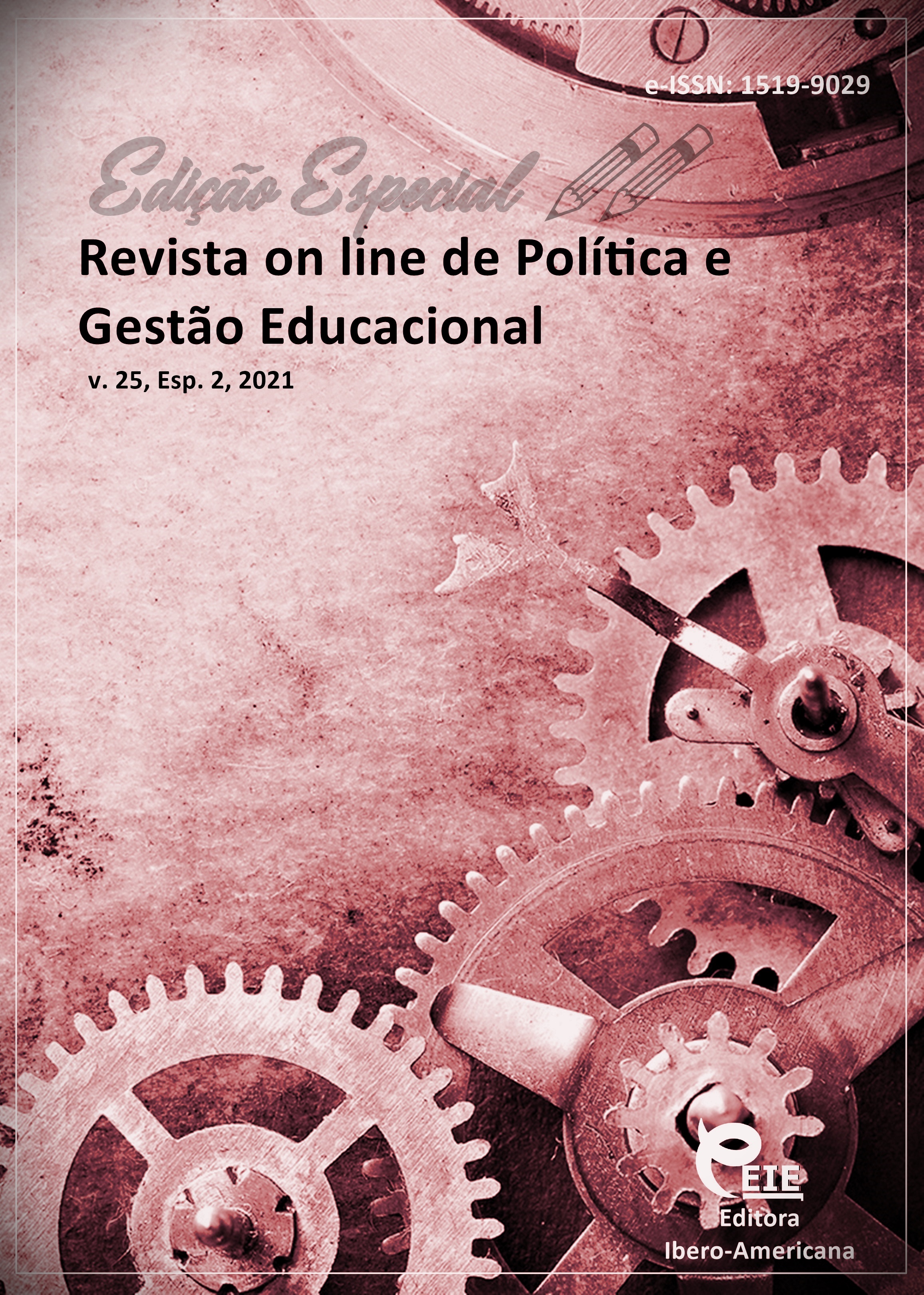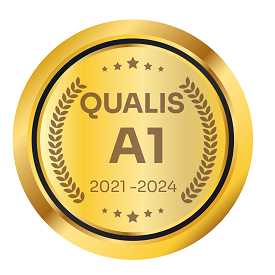El marco categórico de la teoría de la formación de la creatividad comunicativa de estudiantes universitarios
DOI:
https://doi.org/10.22633/rpge.v25iesp.2.15277Palabras clave:
Creatividad comunicativa, Teoría de la formación de la creatividad comunicativa, Enfoques científicos, PrincipiosResumen
El papel de la comunicación, la especificidad y el flujo de los procesos de comunicación y, en consecuencia, los requisitos para sus participantes, está aumentando en la sociedad moderna y en todos los ámbitos de la actividad profesional. En este sentido, se actualiza el problema de la formación de la creatividad comunicativa de los estudiantes en la etapa de formación profesional en la universidad. En la actualidad, este aspecto de la formación profesional de los estudiantes en áreas técnicas carece de atención tanto en la teoría como en la práctica de la educación profesional. El artículo examina los fundamentos teóricos de la teoría de la formación de la creatividad comunicativa de los estudiantes universitarios, interpretada como un conjunto de componentes interrelacionados e interdependientes que representan una cierta integridad basada en el uso de un conjunto de enfoques científicos: sistémico, participativo y discursivo. , implementado sobre la base de los principios: transformación del contenido cognitivo en emocional, libertad de elección de las comunicaciones, refuerzo social del comportamiento creativo. Los enfoques científicos considerados en el artículo fueron los fundamentos teóricos para el desarrollo de la teoría de la formación de la creatividad comunicativa de los estudiantes universitarios. Los materiales del artículo tienen un valor práctico para organizar el proceso de formación profesional en el contexto del desarrollo de la creatividad comunicativa de los estudiantes.
Descargas
Citas
AKULOVA, I.S. et al. Experiences of tolerance: historical and philosophical analysis of multiculturalism (on the example of Magnitogorsk, Russia). The Social Sciences, Pakistan,. v. 11, n. 3, p. 6532-6535, 2016.
ALEKSEEVA, N. A. Formation of communicative creativity of a future specialist when teaching foreign languages: author’s abstract, Candidate of Psychological Sciences: 19.00.07. 2008. 232 p.
ANTROPOVA, L. G. Improvement of the teacher's communicative competence on the basis of creative reflection (in the context of additional education): author’s abstract, Candidate of Pedagogical Sciences: 13.00.01. 1999. 217 p.
ANTROPOVA, L. I.; LESHER, O.V.; FILATOV, V.V. Humanitarian training of engineers. Bulletin of G.I. Nosov Magnitogorsk State Technical University, v. 2, n. 26, p. 69-71, 2009.
AVERIANOV, A. N. Systematic knowledge of the world: methodological problems. Moscow: Politizdat, 1985. 263 p.
AZARENKO, S. A. et al. Humanitarian encyclopedia: concepts. Center for Humanitarian Technologies, 2002.
BAKHOLSKAIA, N. A. The impact of interactive learning on the development of the professional orientation of pedagogical students of higher educational institutions // Humanitarian and pedagogical research. G.I. Nosov Magnitogorsk State Technical University, v. 1, n. 1, p. 45-49, 2017.
BAKHOLSKAYA, N. A. et al. The impact of interactive model for university student teaching on their professional competence development. Revista Inclusiones, v. 6, n. 2, p. 179-184, 2019.
BLAUBERG, I. V. Formation and essence of the system approach. Moscow: Nauka, 1973. 270 p.
BOIKO, S. A. Teaching literary translation based on cognitive-discourse analysis of the text (English language, language university): author’s abstract, Candidate of Pedagogical Sciences: 13.00.02. 1992. 187 p.
BYSTRAI, E. B. Intercultural and participatory approach as a theoretical and methodological strategy for the formation of intercultural pedagogical competence. Bulletin of Orenburg State University, n. 6, p. 78-83, 2003.
DOLGIKH, M. V. Development of the communicative competence of university students: author’s abstract, Candidate of Pedagogical Sciences: 13.00.08. 2007. 193 p.
GRETSOV, A. G. Training of creativity for senior school and university students. St. Petersburg: Piter, 2008. 208 p.
IAKOVLEV, E. V. Pedagogical concept: methodological aspects of construction: monograph. Moscow: VLADOS, 2006. 239 p.
KARUNNAIA, O. V. Formation of communicative competence of teenagers when working with a fairy tale: author’s abstract, Candidate of Pedagogical Sciences: 13.00.01. 2008. - 237 p.
KAZIKIN, A. V.; LESHER, O. V.; TULUPOVA, O. V. Development of communicative creativity in masters of technical university: methodological aspect. Modern Journal of Language Teaching Methods, v. 7, n. 9, p. 29-40, 2017
KONARZHEVSKII, I. U. A. Pedagogical analysis of the educational process as a factor of increasing the efficiency of general education school management: author’s abstract, Candidate of Pedagogical Sciences: 13.00.01. Moscow, 1980. 32 p.
KUBRIAKOVA, E.S. Towards the concepts of discourse and discourse analysis in modern linguistics: an overview. Discourse, speech, speech activity: functional and structural aspects. Moscow, 2000. p. 5-13.
.
LESHER, O. V. et al. Diagnostics of the development of communicative creativity of university students in the process of intercultural communication. News of the Russian Academy of Education, v. 1, n. 25, p. 83-92, 2013.
LESHER, O. V.; KAZIKIN, A. V. Formation of students' creative identities in schools of higher education: structural and substantive aspects. Modern Journal of Language Teaching Methods, v. 6, p. 244-247, 2016.
MARIANNE, W. et al. Phillips. Discourse analysis. Theory and method. Kharkiv: Publishing house "Humanitarian Center", 2008. 352 p.
MESHCHERIAKOV, B. G.; ZINCHENKO, V. P. (Eds.) The great psychological dictionary: AST; AST-Moscow; Praim-Evrozna. Moscow: 2008. 860 p.
]
PASSOV, E. I. Forty years later or a hundred and one methodical idea. Moscow: GLOSSA-PRESS, 2006. 240 p.
POLAT, E. S. et al. New pedagogical and information technologies in the education system. Moscow: Publishing center “Academiia", 2003. 272 p.
SERIO, P. Discourse analysis in the French school (discourse and interdiscourse). 2. ed. Moscow: JSC IG "Progress", 1999. 416 p.
STUBBS, M. Discourse analysis: the sociolinguistic analysis of natural language. Oxford: Blackwell, 1983. p. 55-93.
Publicado
Cómo citar
Número
Sección
Licencia
Derechos de autor 2021 Revista on line de Política e Gestão Educacional

Esta obra está bajo una licencia internacional Creative Commons Atribución-NoComercial-CompartirIgual 4.0.
Manuscritos aceitos e publicados são de propriedade da Revista on line de Política e Gestão Educacional. É vedada a submissão integral ou parcial do manuscrito a qualquer outro periódico. A responsabilidade do conteúdo dos artigos é exclusiva dos autores. É vedada a tradução para outro idioma sem a autorização escrita do Editor ouvida a Comissão Editorial Científica.











